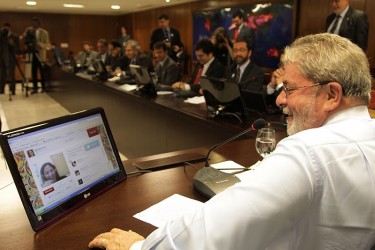Outgoing Brazilian president Luis Inácio Lula da Silva (Lula) was interviewed [pt] for the first time this week by a range of progressive bloggers, an event seen by many as a major step [pt] in the ongoing push for a more democratic media system [pt] in the country.
The two hour session was also streamed online, allowing bloggers to participate via webcam through microblogging site, Twitter.
A range of topics [pt] were covered, including political reform within Brazil, abortion, education, corruption, and the country's foreign policy.
Media reform was particularly high on the agenda, with Lula affirming,
Eu sou o resultado da liberdade de imprensa neste país. A maior censura que existe é acreditar que a mídia não pode ser criticada.
I am the result of freedom of the press in this country. The greatest censorship that exists is to believe that the media cannot be criticised.
He rallied against the spread of misinformation and called for a tighter regulation of Brazil's media industry. He criticised Brazil's mainstream press for arousing fear by exaggerating the extent to which the country would be affected by the global financial crisis, and for reporting false causes behind the TAM Airlines plane crash in 2007.
Brazil's mainstream media remains in the hands of few reigning families, chief among them being the Marinho family, which owns the country's major broadcasting network, Rede Globo [pt]. Historically in close association with the military dictatorship (1964-84), Globo has been well-poised to consolidate and exert its control in television, film, radio and print.
Newspapers have frequently come under fire for serving political interests, most recently in the country's presidential elections, during which current president-elect, Dilma Rousseff, was largely seen as having been the victim [pt] of a mainstream media massacre. Major dailies and magazines swooped into the runoff debate, capitalising on controversial issues, such as religion and abortion, which leave Brazil fiercely divided.
The outgoing president was quizzed over the proposals made at last year's first National Conference of Communication [pt]. The need for more extensive regulation, citizen participation and social control within mainstream media were among the proposals drafted at the conference, with Lula reassuring bloggers that they will be submitted to Brazil's Congress. He added that the debate was now in the hands of Dilma, who pledged greater press freedom in Brazil during her acceptance speech on 31st October.

President Lula chats to blogger Conceição Oliveira via Twitcam during his first interview with Brazilian bloggers. Image by Ricardo Stuckert/PR, from Blog do Planalto's Flickr photostream. Reproduced under a Creative Commons license.
For those who attended, the session signalled the opening a new channel of a more progressive communication between decision makers and non-mainstream media forces. One web user, participating via Twitcam, called the session “emotional” [pt]. Notable political blogger Rodrigo Vianna [pt], while reminding readers that “old” media would still remain, said,
Não sei se os leitores têm dimensão do que isso significa: quebrou-se o monopólio. Internautas puderam perguntar, via twitter. O mundo da comunicação se moveu. Foi simbólico o que vimos hoje.
I don't know if readers get the dimensions of what this means: the monopoly has broken. Via Twitter, Internet users could ask questions. The world of communication moved. What we saw today was symbolic.
Renato Rovai, editor of liberal current affairs magazine Revista Forum [pt], was equally positive [pt]:
Ela entra para a história da cobertura política brasileira.
It [the interview] entered the history of the coverage of Brazilian politics.
The very group of bloggers invited to attend was also significant, writes participant Leandro Fortes [pt]:
Esse mesmo grupo foi chamado por Serra, no auge da baixaria da campanha eleitoral, de representantes de “blogs sujos”, uma referência nervosa a um tipo de mídia que pegou o tucano, uma criatura artificialmente sustentada pela velha mídia corporativa, no contrapé. Nem Serra, nem ninguém na velha direita brasileira estavam preparados para o poder de reação, análise e crítica da blogosfera e das redes sociais. Matérias falsas, reportagens falaciosas, discursos hipócritas, obscurantismo religioso e a farsa da bolinha de papel, tudo, tudo foi desmontado em poucas horas dentro da internet. Chamar-nos de “sujos” nem de longe nos alcançou como ofensa, pelo contrário. Nós, os “sujos” fizemos a história dessa eleição. Serra e seus brucutus terceirizados sumiram no ralo virtual.
This very same group was called by Serra, at the peak of the immoral election campaign, the voices of “sordid blogs”, making a nerve-racking reference to the type of media which caught the toucan [a term for Serra], an artificial creature supported by the old media, on the back foot. Neither Serra, nor anyone in the old Brazilian right-wing expected the power of reaction, analysis and criticism of the blogosphere and other social networks. Fake articles, fallacious reports, hypocritical discourses, religious obscurantism and the bolinha de papel farce were unveiled within a few hours on the Internet. We, the “sordids” made the history of this elecetion. Serra and his pre-historic outsourced friends disappeared in the virtual drain.
Participants were, however, quick to point out the session's failures. Vianna noted that pressing issues of human rights, land reform, justice and public health were not covered in enough detail, overshadowed instead by the discussion of communications. Also lamented was the absence of female bloggers, although Conceição Oliveira, of the blog Maria Fro [pt] (who also blog as Conceição Lemes at Vi o Mundo) [pt] participated via Twitcam.
Lula seemed convinced of the power of engaging with citizens through social media, promising he will blog and tweet in the future. Brazil has the second-highest amount of Twitter users in the world after the United States, and its Internet users straddle anywhere between 67 to 73 million. Social networking sites such as Orkut and, to a lesser extent, Facebook, also remain wildly popular.







2 comments
PLEASE RECONSIDER THE BELO MONTE PROJECT DON’T DO HA TO YOUR ANCESTORS TO THE EARTH TO THE INDIGENOUS PEOPLE … RESPECT, STAND UP MR. PRESIDENT !!!!!!!!! RECONSIDER !!!!! FOR YOUR PEOPLE … STOP THE BELO MONTE PROJECT